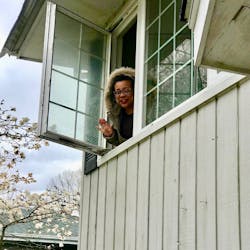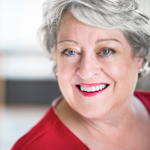Sponsored article
Dental health care providers and patients have been put into a proverbial holding pattern for the last couple of months. Just like a flight plan that can change at any moment, dental professionals are altering their patient communication strategies and planning new ways to help patients receive treatment and stay healthy.
Dental hygienists report that patients are delaying treatment or rescheduling until they feel more comfortable about receiving care in our new environments or can take time off from their jobs. It’s all about adaptability and individual patient assessment.
Dental professionals are well versed that reduction of inflammation not only supports oral health, but overall systemic wellness. Today, more than ever, patients are tuning into the message that microbes are smart, and that keeping the oral cavity clean is a great strategy to reduce disease risk.
With these concepts in mind, it is our professional responsibility to be open to alternative ways patients can reduce the oral microbial overload on a daily basis. If oral irrigation has not been a part of your professional toolbox, this is a perfect time to give the concept a chance.
Putting a holding pattern into practice
Karen Loch Webster, RDH, PHDH, is the dental program manager at Tri City Health Partnership, a free medical and dental clinic that serves uninsured, low-income residents in communities west of the Chicago metro area. Karen uses a hands-on, real-life approach in managing the clinical aspects of her position.
Last year, Karen applied for a grant to support two goals: updating clinical equipment and conducting a study of clinic patients who have diabetes. The grant funds came through and in January, and Karen began to offer a Waterpik oral irrigator to a selected number of diabetic patients. Her goal was to evaluate the benefit of biofilm reduction in diabetic patients using a Waterpik oral irrigation device. She had just started seeing results when the dental clinic closed due to COVID-19.
Keeping the connection
As soon as the clinic was forced to close, Karen started making wellness calls to check on her patients. The patient response was heartwarming. During a live interview last May, Karen mused “It has been interesting. Many of our patients have both physical ailments as well mental issues. Although I cannot see them in person at this time, I am able to talk about their concerns and offer advice and encouragement.”
According to Karen, most patients were noticing a great improvement in their gum health since they began using their Waterpik. In May Karen said, “I am so anxious to get back into the clinic to see the results myself.” Karen knew there would be extra work when she got back to her regular schedule, but expressed her sentiments in this way, “I hope my efforts during this holding pattern will make it easier for all of us in the long run.”
Karen was not the only one at the Tri City Health Partnership who is reaching out to clinic patients to let them know they are not forgotten. It is no wonder why Karen knows she has found her forever home as a health care professional.
Three months later
The Tri City Health Partnership Clinic is up and running again. Like all other health care facilities, Karen and her coworkers have spent hours reconfiguring the facility, having new equipment installed, and figuring out new protocols that meet current infection control guidelines. And slowly she has been able to resume providing clinical care.
While she has not seen everyone yet, she is seeing progress. One patient named Roberto had a dramatic reduction in bleeding points. Many have told Karen how much better their mouths feel since they started water flossing. As these patients get medical updates, she knows that their lab results will move in the direction of health. Since the Waterpik devices have tips for multiple users, many recipients are sharing the device with other family members, so the gift just keeps on giving. Karen continues to be a problem solver. One recipient had left his device at a friend’s house, and then the quarantine hit. Karen suggested he arrange a porch pickup at his friend’s house so he could begin using it again.
The clinic has resumed its efforts to get the word out to the community about their services, which are free to those whose incomes fall under a certain threshold. While most find out about the clinic by word-of-mouth, the TCHP distributes bilingual brochures to businesses who employ a lot of low-wage workers. Many of the clients work in the food service industry or in businesses that do not offer health benefits.
Language can present a significant communication barrier, but Karen has learned enough basic Spanish to communicate with a large number of patients. While Karen can’t always rely on having a translator, she uses a communication tool that every dental professional learns. She knows how to read the smiles and the grateful looks in their eyes. As Karen reflects on what she has accomplished over her last few years at TCHP, she knows that she has found her true calling. She and her colleagues are restoring faith and improving health outcomes for those they serve. The icing on the is Karen’s ability to provide selected patients with a Waterpik device to help improve their oral and overall health. It simply can’t get any better!
Communication in a time of uncertainty
What can we learn from Karen? Each of our patients comes with a unique set of health factors. Is it time to consider an alternative approach to biofilm disruption beyond traditional brushing and flossing? Are you willing to encourage a patient to reduce the microbial overload and reduce inflammation using a water flosser? Now is the perfect time to be flexible and help patients create their own unique holding pattern in this challenging world.
Editor's note: This article is supported by Waterpik and has been reviewed for editorial integrity.
ANNE NUGENT GUIGNON, MPH, RDH, CSP, a visionary thinker, has received numerous accolades over four decades for mentoring, research, and guiding her profession. As an international speaker and prolific author, Anne focuses is on the oral microbiome, erosion, hypersensitivity, salivary dysfunction, ergonomics, and employee law issues. She may be contacted at [email protected].








